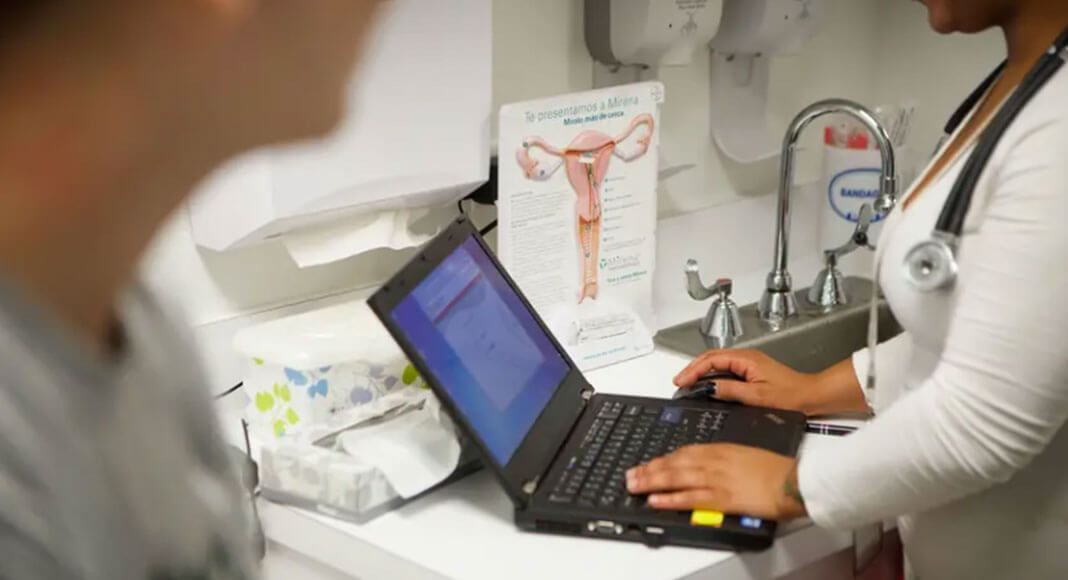
The Texas Tribune
BY REESE OXNER / THE TEXAS TRIBUNE
The U.S. Supreme Court on Wednesday refused to block Texas’ new law banning abortions as early as six weeks into pregnancy, keeping in place, at least for now, perhaps the most restrictive abortion law in the country.
The decision came as major providers in the state said they had canceled most of their abortion appointments and advocates fretted that the procedure had been all but banned in Texas.
The new restrictions went into effect Wednesday before the U.S. Supreme Court revealed its decision later that night. The vote was 5 to 4, with the court’s three liberals dissenting, joined by Chief Justice John G. Roberts Jr., who called the law “not only unusual, but unprecedented.” The Supreme Court stated it was not ruling on the constitutionality of the bill, but rather it was refusing to block it at this point.
“In reaching this conclusion, we stress that we do not purport to resolve definitively any jurisdictional or substantive claim in the applicants’ lawsuit,” the opinion read. “In particular, this order is not based on any conclusion about the constitutionality of Texas’s law, and in no way limits other procedurally proper challenges to the Texas law, including in Texas state courts.”
The law bans abortions as early as six weeks — a period before many women realize they are pregnant. It places responsibility for enforcing the rule on members of the general public, allowing anyone to sue for damages someone they suspect is “aiding and abetting” an abortion. That design was intended to get around the precedent set by Roe v. Wade, the landmark Supreme Court case that ensured women’s right to an abortion nearly half a century ago. Providers say that the law prevents at least 85% of the procedures previously completed in the state.
Justice Sonia Sotomayor criticized the court for the decision, saying it quietly consented to Texas enacting “a law that flouts nearly 50 years of federal precedents.”
“The Court’s order is stunning,” Sotomayor wrote in her dissent. “Presented with an application to enjoin a flagrantly unconstitutional law engineered to prohibit women from exercising their constitutional rights and evade judicial scrutiny, a majority of Justices have opted to bury their heads in the sand.”
Abortion-rights supporters have feared the Supreme Court might rule against access to the procedure after the death of Justice Ruth Bader Ginsburg nearly a year ago. And while Roe v. Wade in 1973 established a constitutional right to have an abortion before the point of fetal viability, the law skirts that precedent by removing enforcement from the state — instead having private citizens be the mechanism to enforce the law through lawsuits. Sotomayor said that in effect, Texas “deputized the State’s citizens as bounty hunters, offering them cash prizes for civilly prosecuting their neighbors’ medical procedures.”
“The Court finally tells the Nation that it declined to act because, in short, the State’s gambit worked,” Sotomayor said, blasting the court for citing “complex and novel antecedent procedural questions” as reasons to not block the law. “This is untenable. It cannot be the case that a State can evade federal judicial scrutiny by outsourcing the enforcement of unconstitutional laws to its citizenry.”
The law so far has not appeared to prompt a deluge of lawsuits against providers. John Seago, legislative director for the prominent anti-abortion group Texas Right to Life, told The Texas Tribune earlier Wednesday that his organization had prepared to begin filing lawsuits but hadn’t yet, as there wasn’t evidence of violations so soon. He said abortion clinics had all said they would be following the new law.
Planned Parenthood of Greater Texas and Whole Woman’s Health, two of the largest providers in the state with clinics in multiple cities, told reporters Wednesday morning they would be abiding by the law and only offering services still allowed. No other clinics have publicly said they would defy the law.
Before the midnight deadline when the law became effective, hundreds of people engulfed the clinics Tuesday. Twenty-seven women sat in the Whole Woman’s Health Fort Worth clinic at 10 p.m. Tuesday to get an abortion, two hours before the procedure would become illegal in the state, said Amy Hagstrom Miller, CEO of Whole Woman’s Health. A doctor cried as they tried to perform all the procedures before the clock struck midnight. Anti-abortion protesters crowded outside and attempted to stop the last legal abortions occurring in the state.
“This morning, I woke up feeling deep sadness. I am worried. I am numb,” Miller said. “[The law] robs people of their ability to make decisions about their health and their future.”
Texas anti-abortion advocates, meanwhile, celebrated the law as their biggest victory since since Roe v. Wade. And they were gearing up to sue those they believe to violate the law. Texas Right to Life set up a whistleblower website where anyone can file anonymous tips on illegal abortions.
Under the new law, Texans can sue providers or those who they suspect helped a person obtain an abortion performed after an ultrasound could detect what lawmakers defined as a “fetal heartbeat.” Medical and legal experts say the term is misleading, however, because embryos don’t possess a heart at that developmental stage.
Abortion providers originally challenged the new law in July, arguing it violates the precedent established by Roe v. Wade. But the 5th U.S. Circuit Court of Appeals put a hold on district-court proceedings, leading the providers to seek emergency relief from the U.S. Supreme Court. Many onlookers waited late into the night Tuesday, expecting an order from the high court before the law went into effect — but it didn’t come.
Marc Hearron, senior counsel for the Center for Reproductive Rights and lead attorney on the case, said the law is using intimidation tactics to stifle even legal abortions in the state. Suspicion alone could lead to lawsuits, he said.
The mechanism within the law allows people to file numerous lawsuits on the same abortion case, with little consequences if they lose, Hearron said. Even if found not guilty, the law says those being sued cannot recoup their attorney fees — meaning a swarm of lawsuits could financially overwhelm someone or an entity even if they aren’t found guilty. He said it minimizes the risk of suing while removing protections from those being sued.
Hearron said that although he believes this would not apply to those who help Texans get an abortion out of state, they could still potentially be sued and saddled with legal fees.
“We are unwavering in believing that Texans deserve abortion care in their own communities,” Miller said. “We will continue fighting, and do everything we can to protect Texans’ right to safe abortion and compassionate care.”














